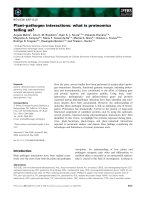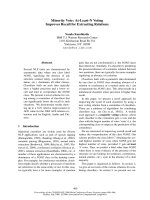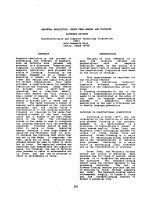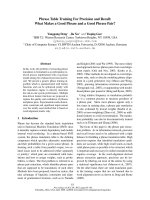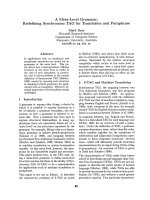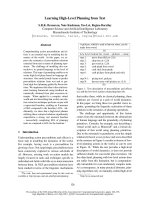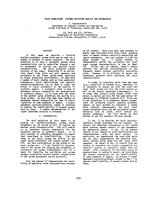Báo cáo "Academic English at tertiary level: What, why and how " pptx
Bạn đang xem bản rút gọn của tài liệu. Xem và tải ngay bản đầy đủ của tài liệu tại đây (128.68 KB, 6 trang )
VNU Journal of Science, Foreign Languages 25 (2009) 112-117
112
Academic English at tertiary level: What, why and how
Nguyen Thi Hong Nga
*
Foreign Language Department, Qui Nhon University,
170 An Duong Vuong, Qui Nhon, Binh Dinh, Vietnam
Received 15
January 2009
Abstract. Academic writing is arguably the most important language skill to tertiary students,
especially to English-major ones, whose grades are largely determined by their performance in
written assignments, academic reports, term examinations and graduation theses. However, reality
has proved the difficulties of Vietnamese learners in applying the right level of formality, lexical
dense, and objectivity. The article, with the hope to help the tertiary English- major students
improve their skill of writing academic English, first deals with an overview on academic English
and the necessity of equipping them with knowledge of academic English. It will also go on to put
forward some strategies for effective writing academic English.
1. Introduction
*
Language proficiency, especially in writing
at tertiary level, is a universal problem. During
the years of teaching writing for students of
English at Quinhon University, I have realized
that the majority of students have concentrated
on such criteria of writing as grammar, ideas,
organization, coherence and unity. However,
the academic factor, the formal English, seems
to be fallen into oblivion. The following quoted
topic sentence from a second-year-student’s
piece of writing illustrates the weakness:
“You know, we all have ever told lies either
for our personal benefits or for others’ […]”.
Obviously, the above sentence is
grammatically correct. However, there exist
some academic problems. The discourse marker
“you know”, which is often employed in
conversations, as well as the assertive language
______
*Tel.: 84-056-3847037.
E-mail:
“we all” makes the sentence sound untentative
and informal.
The illustration partly proves the
complexity of writing academic English and the
necessity of students’ basic knowledge of
academic English. This paper provides a brief
outline of what academic English is, why it is
necessary and how to improve it. It is believed
to be useful to tertiary English-major students
who are learning to write English academic
reports, assignments or theses as the final target.
2. Development
2.1. Academic English defined
Academic English, according to Stephen et
al [1], is the language people use to
communicate outside of and unrelated to any
certain context. People describe and manipulate
abstract ideas, analyze their thoughts and solve
N.T.H. Nga / VNU Journal of Science, Foreign Languages 25 (2009) 112-117
113
problems; the context provides few or no clues
about what the communication means. In
Gersten et al’s point of view [2], academic
English is the language of school-based
learning and extended, reasoned discourse.
Writing academic English refers to a formal
style of expression, namely a formal tone, use
of the third-person rather than first-person
perspective, clear focus on the issue or topic
rather than the author’s opinion, and precise
word choice. Writers employing the academic
style avoid jargon, slang, and abbreviations.
Academic writing, when used appropriately,
presents a polished and professional image.
It can be said that academic writing is linear,
which has one central point or theme with every
part contributing to the main line of argument,
without digressions or repetitions. Its objective is
to inform rather than entertain. Therefore, it is in
the standard written form of English.
2.2. Academic English vs daily spoken English
Academic English is, for the most part, a
written language. In general, it is confined to
the realm of the serious: textbooks, academic or
technical works, and most essays at university.
Academic English tends to be impersonal and
precise, and often uses long, carefully
constructed sentences; the formal writer will
avoid contractions and abbreviations, and will
use a more specialized and complex vocabulary
than that employed in everyday speech.
One must, however, beware of excess
academic writing. It can easily become
incomprehensible because it is too convoluted
or wordy. In recent years the proliferation of
jargon has become altogether too general.
Despite its sophistication, formal language must
remain clear.
Daily spoken English is the language
spoken by most people every day. While
educated speakers retain their knowledge of
formal rules, they're more relaxed about
grammar and less concerned with vocabulary
when they're engaged in ordinary conversation.
In everyday English, sentences tend to be
shorter, and the formal punctuation of the semi-
colon and colon seem to be avoided.
Contractions and the first person are acceptable.
In order to assist tertiary English-major
students with the production of academic pieces
of writing competently, teachers should draw a
distinction between academic English and daily
spoken English .Let’s consider the ways the two
varieties of English are used by two students:
Spoken English: Gimme it (pointing to a
cell phone). I gotta go.
Academic English: Could you please give
me the cell phone because I have to leave?
Notice how context-rich spoken English is.
The student need only point to the cell phone to
convey his/her meaning to his/her friend. In
contrast, notice that informal expressions such
as “gimme” and “gotta” are absent in academic
English and that academic English is
grammatically correct and is characterized by
subordination (because I have to leave) rather
than short, simple sentences. The academic
English version does not depend on context to
convey meaning (Scarcella [3]). Those who
master academic English know its phonological
features, including stress, intonation, and sound
patterns. They also have a command of
vocabulary, everyday words, content-specific
terms, know sentence structure and
morphology. Also, they know how to use
grade-appropriate complex sentences, such as
passive structures.
It can be said that the difference between
academic English and spoken English is not a
difference between correct and incorrect, but a
difference of what is known as register. A
register is a variety of language related to a
particular subject matter or area of activity, a
set of words and expressions as well as
syntactical features that may be said to
characterise that specific area of language.
There are many registers: technical, academic,
mathematical, scientific, etc., we can also speak
of a “formal” and “informal” register in
N.T.H. Nga / VNU Journal of Science, Foreign Languages 25 (2009) 112-117
114
English, but in writing academic English, it
would be normal to draw most of the
vocabulary and expressions from the formal
register. This entails avoiding colloquial
(everyday) or slang expressions in academic
writing assignments.
2.3. The necessity of teaching academic English
to tertiary English - major students in Vietnam
Academic writing is arguably the most
important language skill at university because
students’grades are largely determined by their
performance in written assignments, tests and
examinations or graduation thesis (Leki and
Carson [4]). Therefore, equipping tertiary
English-major students with knowledge of
academic writing is really essential. The reality
of teaching and learning reveals the teachers’
improper emphasis on and the students’ vague
knowledge of writing academic English, which
is partly one of the factors resulting in the poor
ability of using academic style among English-
major students. In fact, in most universities in
Vietnam, the official lectures on academic style
are not usually delivered until the seventh
semester, that is, just before students finish
university. So when being questioned “What do
you know about Academic English?”, 27 out of
50 second-year students of English, who
finished 120 periods of writing at their
universities and covered skills of writing at
sentence level (in the first semester) and of
functional writing (in the second semester) had
similar responds reflecting their vague
knowledge of the issue. Most of them are
unable to identify the distinction between
spoken and written academic style as well as
have no ideas of the features of these types.
Consequently, when they are required to write a
paragraph (in the third and the forth semester) or
an essay (in the sixth and seventh semester) they
fail to produce formal pieces of writing. To
improve the reality, the knowledge of academic
style should be introduced in the second semester
so that students have opportunities to practice the
skill in the five or six remaining semesters.
Such limitations partially explain the reason
why teaching academic English to Vietnamese
university English-major students is an essential
issue.
2.4. Some suggested strategies for teaching
academic English to tertiary English - major
students in Vietnam
From the above discussion of objective and
subjective factors and from my own teaching
experience, I would like to suggest some
strategies to help University teachers raise
English major students’ competence of writing
academic English.
a) Teaching features of academic English
There are six main features of academic
writing that students should know. To some
extent, academic writing is complex, formal,
objective, explicit, hedged, and responsible.
Complexity
Academic English is relatively more
complex than spoken language (Biber [5],
Halliday and Hasan [6]). Grammatically, it has
more subordinate clauses, more "that/to"
complement clauses, more long sequences of
prepositional phrases, more attributive
adjectives and more passives than spoken
language. Lexically, academic writing often
requires longer, more complex words and
phrases. That is, it has more nominalisations,
more noun based phrases, and more lexical
variation. This kind of writing is lexically dense
compared to spoken language - It has
proportionately more lexical words than
grammatical words.
Commonly used techniques in academic writing
include subordinate clauses, complements clauses,
sequences of prepositional phrases, participals,
passive verbs, lexical density, lexical complexity,
norminalization, noun-based phrases, modification
of noun phrases, attributive adjectives.
Formality
Academic writing is relatively formal. In
general this means that in an academic piece of
N.T.H. Nga / VNU Journal of Science, Foreign Languages 25 (2009) 112-117
115
writing, colloquial words and expressions
should be avoided. Following are some
examples.
- Colloquial words and expressions: "stuff",
"a lot of", "thing", "sort of",…
- Abbreviated forms: "can't", "doesn't",
"shouldn't", …
- Two word verbs: "put off", "bring up", …
- Sub-headings, numbering and bullet-points
in formal writings - but use them in reports.
- Asking questions.
Objectivity
Academic language is in general objective
rather than personal. It, therefore, has fewer words
that refer to the writer or the reader. This means
that the main emphasis should be on the
information that you want to give and the
arguments you want to make, rather than you. For
that reason, academic writing tends to use nouns
(and adjectives), rather than verbs (and adverbs).
This is related to the basic nature of
academic study and academic writing, in
particular. Nobody really wants to know what
you "think" or "believe". They want to know
what you have studied and learned and how this
has led you to your various conclusions. The
thoughts and beliefs should be based on your
lectures, reading, discussion and research and it
is important to make this clear.
- Avoid words like "I", "me", "myself",…
A reader will normally assume that any idea
not referenced is your own. It is therefore
unnecessary to make this explicit.
Don't write: "In my opinion, this a very
interesting study".
Write: "This is a very interesting study".
- Avoid "you" to refer to the reader or
people in general.
Don't write: "You can easily forget how
different life was 50 years ago".
Write: "It is easy to forget how difficult life
was 50 years ago".
Explicitness
Academic writing is explicit about the
relationships in the text.
- It is explicit in its signposting of the
organisation of the ideas in the text (Biber,
Johansson, Leech, Conrad and Finegan [7]). As
a writer of academic English, it is your
responsibility to make it clear to your reader
how various parts of the text are related. These
connections can be made explicit by the use of
different signalling words.
- It is explicit in its acknowledgment of the
sources of the ideas in the text.
Write:
McGreil (1977:363-408) has shown that
though Dubliners find the English more
acceptable than the Northern Irish, Dubliners
still seek a solution to the Northern problem
within an all-Ireland state.
Don't write:
Although Dubliners find the English more
acceptable than the Northern Irish, Dubliners
still seek a solution to the Northern problem
within an all-Ireland state.
Hedging
It is often believed that academic writing,
particularly scientific writing, is factual, simply
to convey facts and information. However, it is
now recognised that an important feature of
academic writing is the concept of cautious
language, often called "hedging" or "vague
language". In other words, it is necessary to
make decisions about the stance on a particular
subject, or the strength of the claims that are
being made. Different subjects prefer to do this
in different ways.
Responsibility
In academic writing writers must be
responsible for, and must be able to provide
evidence and justification for, any claims you
make. Writers are also responsible for
demonstrating an understanding of any source
texts you use.
N.T.H. Nga / VNU Journal of Science, Foreign Languages 25 (2009) 112-117
116
b) Setting the acceptable writing behaviours
In academic writing, there is a standard that
we can refer to as acceptable writing behaviour.
Cneanseco and Bryd (1989), Horowitz (1986a,
b), Johns (1986), Reid (1984, 1985, 1987,
1989), Shih (1986), Strauch (1997), Raimes
(1992), Grabe and Kaplan (1996), concur that
there is a standard of acceptable writing
behaviour. That there is standard is also evident
in the various marking rubrics used to assess
academic writing at different levels of
development (in Peet [8]).
As stated in the marking guidelines used in
IGCSE exams, the criterion on assessing
academic writing refers to content:
Answering the question
… Does the student make his/her answer
interesting using colourful details, personal
experiences and/or facts?
Paragraphing
Has the student organised his/her work into
paragraphs? Are the paragraphs in the right
sequence and accurately linked together so the
writing makes a coherent whole?
Subject matter
How well does the student deal with the
topic? Does s/he get straight into the topic and
seem interested in it, and make the reader
interested in it?
Sense of argument
Is the argument set out clearly and logically
and does the writer come to a clear conclusion?
… Does the writer give clear examples? Are
linking words (e.g. however, moreover, …) used,
and do these help make the meaning clear?
So, in order to best enable the students to
achieve desirable results, teachers should train
them the habits of applying the above
guidelines to each of their piece of writing.
3. Conclusion
In sum, it is not always easy to choose
which right level to pitch the language of an
assignment. All academic work should
generally be presented in a reasonably formal
style, and should not normally use a lot of
everyday “street” language. However, this does
not mean that it should be excessively stuffy
and formal either. Expressing something in a
clear, logical and critical way is one of the
requirements of good academic writing.
The analysis of the differences between the
academic and spoken English together with
suitable strategies for teaching academic English
are thought to be useful for tertiary English-major
students. Once the strategies are applied in
parallelism with the learners’ attempt, it is
believed that competence of writing academic
English among the students can be improved.
References
[1] C. Stephen, Wright, Donald M. Taylor, Judy
Macarthur, Journal of Educational Psychology Vol.
92, No.1 (2000) 63, Subtractive Bilingualism and
the Survival of the Inuit Language: Heritage Versus
Second-language Education, American
Psychological Association.
[2] R. Gersten, S.K. Baker, T. Shanahan, S. Linan-
Thompson, P. Collins, R. Scarcella, Effective
literacy and language instruction for English
learners in the elementary grades, An IES practice
guide, DC: IES, Department of Education,
Washington, 2007.
[3] R. Scarcella, Accelerating Academic English: A
Focus on the English Learner, Regents of the
University of California, Oakland, California, 2003.
[4] I. Leki, J. Carson, Students’ perceptions of EAP
writing instruction and writing needs across the
disciplines, TESOL Quarterly 28 (1994) 81.
[5] D. Biber, Variation Across Speech and Writing,
pp.3-27, Cambridge University Press, Cambridge,
England, 1988.
[6] M.A.K. Halliday, R. Hasan, Language, context and
text: Aspects of language in a Social Semiotic
Perspective, OUP, Oxford, 1989.
[7] Biber, Johansson, Leech, Conrad, Finegan,
Longman grammar of spoken and written English,
Longman, London, 1999.
[8] K. Peet, Academic Writing, from
dwrite2_kendall.htm, 2009.
N.T.H. Nga / VNU Journal of Science, Foreign Languages 25 (2009) 112-117
117
Tiếng Anh học thuật ở bậc đại học:
Nét khái quát, tính cấp thiết và một số đề xuất
Nguyễn Thị Hồng Nga
Khoa Ngoại ngữ, Trường Đại học Quy Nhơn,
170 An Dương Vương, Quy Nhơn, Bình Định, Việt Nam
Viết tiếng Anh học thuật được xem là kỹ năng quan trọng nhất đối với sinh viên bậc đại học, đặc
biệt là đối với sinh viên tiếng Anh. Ở nước ta hiện nay, việc đánh giá năng lực ngôn ngữ của sinh viên
chủ yếu dựa vào các hình thức viết: tiểu luận, báo cáo khoa học, các bài thi học phần, và luận văn tốt
nghiệp. Tuy nhiên, thực tế cho thấy hầu hết sinh viên tiếng Anh còn gặp nhiều khó khăn trong việc
chọn lựa văn phong và ngôn ngữ phù hợp để diễn tả tính khách quan của các bài viết học thuật. Trong
phạm vi bài viết này, chúng tôi xin giới thiệu vài nét khái quát về tiếng Anh học thuật, sự cần thiết của
việc trang bị cho sinh viên tiếng Anh một số kiến thức về tiếng Anh học thuật, đồng thời đề xuất một
số giải pháp nhằm giúp sinh viên hoàn thiện khả năng viết tiếng Anh học thuật của mình.

